英语中used to,be used to, get used to以及be uased to总结
不同的used to
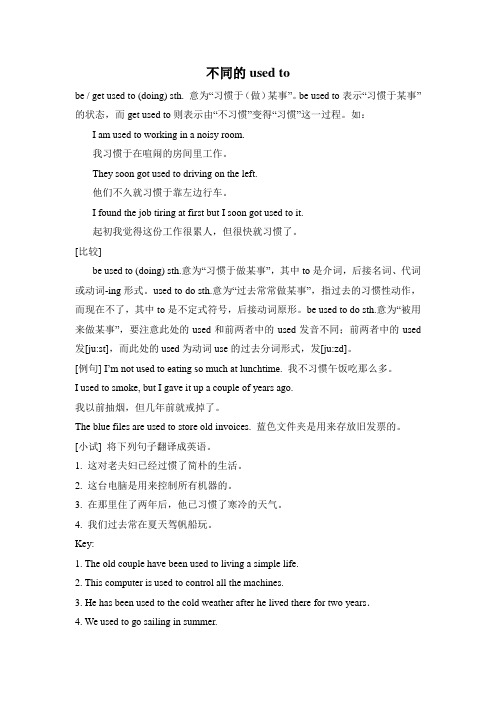
不同的used tobe / get used to (doing) sth. 意为“习惯于(做)某事”。
be used to表示“习惯于某事”的状态,而get used to则表示由“不习惯”变得“习惯”这一过程。
如:I am used to working in a noisy room.我习惯于在喧闹的房间里工作。
They soon got used to driving on the left.他们不久就习惯于靠左边行车。
I found the job tiring at first but I soon got used to it.起初我觉得这份工作很累人,但很快就习惯了。
[比较]be used to (doing) sth.意为“习惯于做某事”,其中to是介词,后接名词、代词或动词-ing形式。
used to do sth.意为“过去常常做某事”,指过去的习惯性动作,而现在不了,其中to是不定式符号,后接动词原形。
be used to do sth.意为“被用来做某事”,要注意此处的used和前两者中的used发音不同;前两者中的used 发[ju:st],而此处的used为动词use的过去分词形式,发[ju:zd]。
[例句] I’m not used to eating so much at lunchtime. 我不习惯午饭吃那么多。
I used to smoke, but I gave it up a couple of years ago.我以前抽烟,但几年前就戒掉了。
The blue files are used to store old invoices. 蓝色文件夹是用来存放旧发票的。
[小试] 将下列句子翻译成英语。
1. 这对老夫妇已经过惯了简朴的生活。
2. 这台电脑是用来控制所有机器的。
3. 在那里住了两年后,他已习惯了寒冷的天气。
4. 我们过去常在夏天驾帆船玩。
Key:1. The old couple have been used to living a simple life.2. This computer is used to control all the machines.3. He has been used to the cold weather after he lived there for two years.4. We used to go sailing in summer.。
英语中考牢记20组易混易错词语辨析
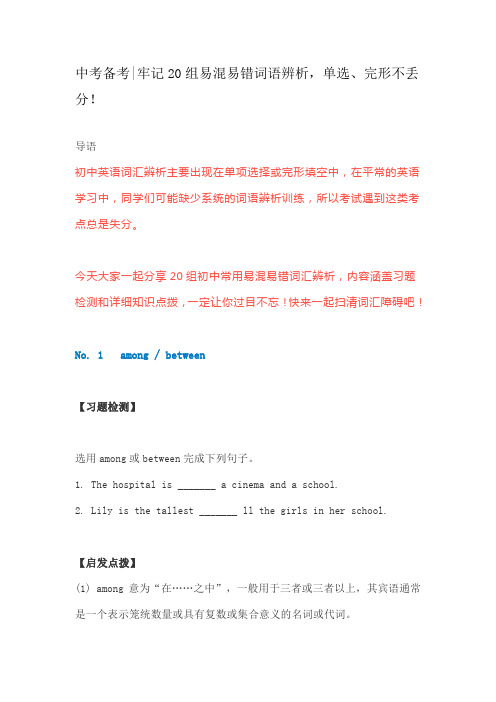
中考备考|牢记20组易混易错词语辨析,单选、完形不丢分!导语初中英语词汇辨析主要出现在单项选择或完形填空中,在平常的英语学习中,同学们可能缺少系统的词语辨析训练,所以考试遇到这类考点总是失分。
今天大家一起分享20组初中常用易混易错词汇辨析,内容涵盖习题检测和详细知识点拨,一定让你过目不忘!快来一起扫清词汇障碍吧!No. 1 among / between【习题检测】选用among或between完成下列句子。
1. The hospital is _______ a cinema and a school.2. Lily is the tallest _______ ll the girls in her school.【启发点拨】(1) among意为“在……之中”,一般用于三者或三者以上,其宾语通常是一个表示笼统数量或具有复数或集合意义的名词或代词。
(2) between一般指两者之间,其宾语通常是表示两者概念的名词或代词,或由and连接的两个具体的人或物。
between有时也可表示多者之中的“两两之间”。
如:Switzerland lies between France, Germany, Austria and Italy.Key:1. between2. amongNo. 2 lay / lie【习题检测】用lay或lie的适当形式完成句子。
1. I _______ the table when my mother cooked the meal.2. John was ill and _______ in bed all morning.【启发点拨】(1) lay作动词,可意为“摆放(餐桌)”,其过去式与过去分词均为laid,现在分词为laying,常用于短语lay the table,意为“摆放餐桌”。
如:Tom was laying the table.(2) lie作动词,意为“躺;平躺”时,过去式为lay,过去分词为lain,现在分词为lying。
used to,be used to 和 get used to 的用法区别习题(答案及解析)

Used to 意为“曾经”,用于过去持续或经常发生的事,后面跟不带 to 的不定式,be used to 表示习惯于某事,对某事很熟悉或不陌生,而 get used to 表示变得习惯于某事,它们后面跟名词或动名词。
一、用 used to,be used to 或 get used to 完成下面的句子1、He _______ in Spain but now he lives in London.A. is used to liveB. used to livingC. use to liveD. used to live2、Don't worry, it's a simple program to use. You _____ it in no time, I'm sure.A. are used toB. will get used toC. used to useD. will get use to it3、When I had to search for work every day I _____ very early.A. used to getting upB. used to get upC. use to get upD. used to got up4、Sara was shocked when she joined our busy company because she _____ doing much work everyday.A. wasn't used toB. didn't use toC. wasn't use toD. didn't used to5、Working till 10pm isn't a problem. I _____ late. I did it in my last job too.A. am used to finishingB. get used to finishingC. am use to finishingD. none of the above6、See that building there? I _____ to school there, but now it's a factory.A. used to goingB. get used to goingC. used to goD. used to get going7、He _____ several books a month but he doesn't have time any more.A. was used to readingB. used to readC. got used to readingD. use to read8、When ِA hmed was the head of our company , everything _____ well organized. Now it's total chaos here.A. got used to beB. was used to beingC. used to beD. was using to be9、He _____ fat , but now he is thin.A. used to beB. used to beingC. use to beD. used of being10、Did you _____ write poems when you were young?A. used toB. use toC. used not toD. none of the above11、After the holidays it takes me a week _____ up early again.A. to get used to gettingB. to get used to getC. to be used to getD. to be used to getting12、I _____ to play football when I was young. I'm too old and fat to play now.A. usedB. got usedC. useD. was used13、At first it was difficult for her to speak in French all the time but she _____ to it now.A. is usedB. was usedC. usesD. has use二、答案及解析1、used to live解析:He 是第三人称,所以排除use to live;used to do sth,所以排除 used to living;is used to live 意思不合理,所以选 used to live。
初中英语情态动词之usedto
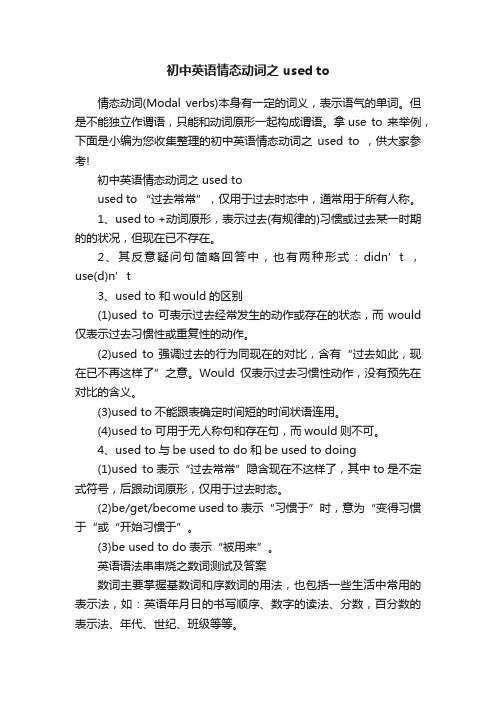
初中英语情态动词之 used to情态动词(Modal verbs)本身有一定的词义,表示语气的单词。
但是不能独立作谓语,只能和动词原形一起构成谓语。
拿use to 来举例,下面是小编为您收集整理的初中英语情态动词之used to ,供大家参考!初中英语情态动词之 used toused to “过去常常”,仅用于过去时态中,通常用于所有人称。
1、used to +动词原形,表示过去(有规律的)习惯或过去某一时期的的状况,但现在已不存在。
2、其反意疑问句简略回答中,也有两种形式:didn’t ,use(d)n’t3、used to 和would的区别(1)used to 可表示过去经常发生的动作或存在的状态,而would 仅表示过去习惯性或重复性的动作。
(2)used to 强调过去的行为同现在的对比,含有“过去如此,现在已不再这样了”之意。
Would仅表示过去习惯性动作,没有预先在对比的含义。
(3)used to不能跟表确定时间短的时间状语连用。
(4)used to 可用于无人称句和存在句,而would则不可。
4、used to与be used to do和be used to doing(1)used to表示“过去常常”隐含现在不这样了,其中to是不定式符号,后跟动词原形,仅用于过去时态。
(2)be/get/become used to 表示“习惯于”时,意为“变得习惯于“或“开始习惯于”。
(3)be used to do表示“被用来”。
英语语法串串烧之数词测试及答案数词主要掌握基数词和序数词的用法,也包括一些生活中常用的表示法,如:英语年月日的书写顺序、数字的读法、分数,百分数的表示法、年代、世纪、班级等等。
一、写出下列数字的序数词:1,2,3,5,9,12,20,34二、写出1—12月份:三、选择填空:1.Couldyoutellushowtoreadthenumber18,306,211?A.eighteenmillion,threehundredandsixthousands,twohundre delevenB.eighteenmillion,threehundredandsixthousand,twohundre dandelevenC.eighteenmillions,threehundredsixthousands,twohundreds andelevenD.eighteenthousand,threehundredandsix,twohundredeleven2.Shakespearewasbornin______。
used to的用法

used to的用法一、"used to" 的基本用法"used to" 是英语中常用的表达过去习惯或状态的结构之一。
它可以用于描述过去时但现在已经没有了的习惯,也可以表示曾经拥有的某种状态或特征。
在使用"used to" 结构时需要注意其动词变形规则以及与其他相似结构的区别。
1.1 表达过去习惯"used to" 通常用于表达过去已经不存在的习惯或反复发生的动作。
它由助动词"used" 和不定式 "to" 组成。
例如:- I used to live in London. (我过去住在伦敦。
)- She used to play the piano every day. (她过去每天弹钢琴。
)1.2 表达曾有状态或特征另外,"used to" 也可用来表示曾经拥有、持有或具备某种特征或状态,强调该状态在现在是不存在的。
例如:- He used to have long hair. (他曾经留长发。
)- We used to be good friends. (我们曾经是好朋友。
)二、区别 "used to" 和 "be/get used to"尽管两者看起来相似,但它们在含义和用法上存在明显区别。
2.1 "used to"- 描述:强调过去的习惯或状态,现在已不存在。
- 结构:used + 动词原形 + 其他成分。
- 时态:一般用于过去时。
- 变化形式:肯定句、否定句和疑问句都可用。
2.2 "be/get used to"- 描述:描述适应一种新环境或情况,表示某人对某事物或经历感到习以为常,不再陌生或不适应。
- 结构:be/get + used to + 名词/动名词/代词/从句。
used to do, be used to doing, be used to do辨析及训练巩固

ed to do sth. 过去常常做某事(意思现在不做了)例: I used to get up early and take an hour's walk before breakfast.我过去常常起床很早并且在早餐前散步一小时。
2.be /get used to doing sth ; be /get used to sth .习惯于做某事.(这里的to 是介词.)例: She isn’t used to living in the countryside now.她不习惯在乡下生活。
Are you used to the food here?你习惯吃这儿的饭菜吗?3. be used to do sth. 被用来做某事例: Computers are used to do many things for people now.现在计算机被用来做许多事情。
随堂练习A. 选用适当的词组填空:1. Life here is much easier than it ____________ be.2. He ______________ hard work.3. I’ve lived in Paris for six years now so I’m quite _________ the traffic.4. It’s difficult to understand Scottish people if you______________ their accent.5. It was a bit of a shock: I___________________ paying so much for a sandwich and a glass of beer.6. I don’t play tennis much these days but I ____________.7. The wood ______________ make desks and chairs.B. 动词填空:1. You’ll soon get used to ___________ (live) in the country.2. I never used to ___________ (eat) cakes but I eat a lot now.3. I’m not used to _____________ (treat) like this.4. When I was younger I was used to ____________ (walk) long distances.5. I used to ___________ (go) swimming on Saturdays.6. Didn’t she use to ____________ (live) in Germany?C. 翻译句子:1.几个月后他就习惯了一个人生活了。
关于used to的短语
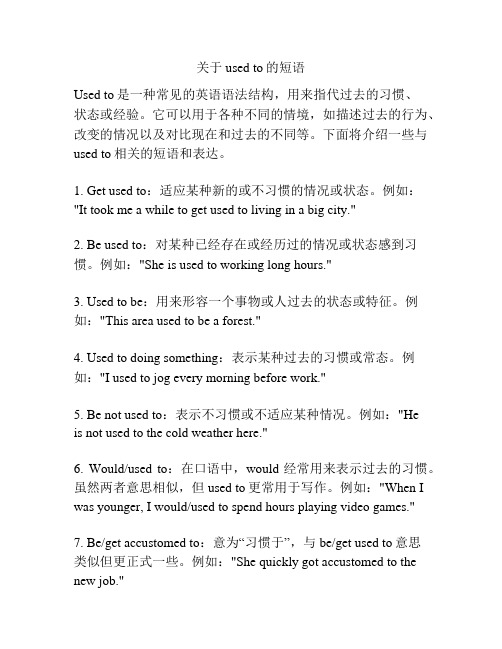
关于used to的短语Used to是一种常见的英语语法结构,用来指代过去的习惯、状态或经验。
它可以用于各种不同的情境,如描述过去的行为、改变的情况以及对比现在和过去的不同等。
下面将介绍一些与used to相关的短语和表达。
1. Get used to:适应某种新的或不习惯的情况或状态。
例如:"It took me a while to get used to living in a big city."2. Be used to:对某种已经存在或经历过的情况或状态感到习惯。
例如:"She is used to working long hours."3. Used to be:用来形容一个事物或人过去的状态或特征。
例如:"This area used to be a forest."4. Used to doing something:表示某种过去的习惯或常态。
例如:"I used to jog every morning before work."5. Be not used to:表示不习惯或不适应某种情况。
例如:"Heis not used to the cold weather here."6. Would/used to:在口语中,would经常用来表示过去的习惯。
虽然两者意思相似,但used to更常用于写作。
例如:"When I was younger, I would/used to spend hours playing video games."7. Be/get accustomed to:意为“习惯于”,与be/get used to意思类似但更正式一些。
例如:"She quickly got accustomed to the new job."8. Break the habit:打破一个习惯或改变一种行为模式。
英语中used to与be used to的区别
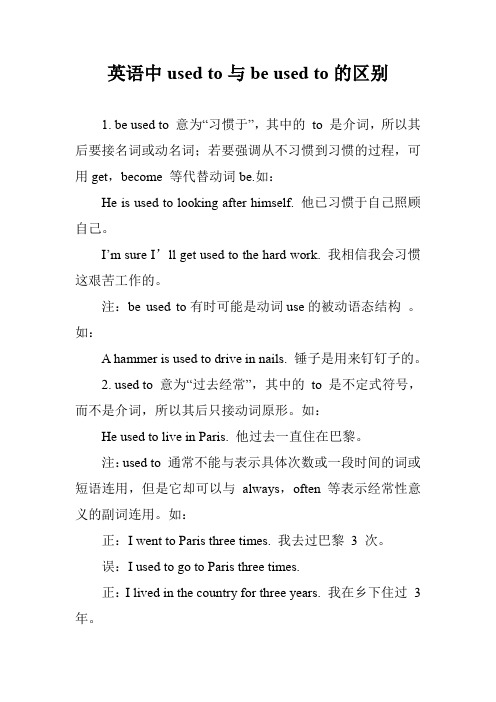
英语中used to与be used to的区别1. be used to 意为“习惯于”,其中的to 是介词,所以其后要接名词或动名词;若要强调从不习惯到习惯的过程,可用get,become 等代替动词be.如:He is used to looking after himself. 他已习惯于自己照顾自己。
I’m sure I’ll get used to the hard work. 我相信我会习惯这艰苦工作的。
注:be used to有时可能是动词use的被动语态结构。
如:A hammer is used to drive in nails. 锤子是用来钉钉子的。
2. used to 意为“过去经常”,其中的to 是不定式符号,而不是介词,所以其后只接动词原形。
如:He used to live in Paris. 他过去一直住在巴黎。
注:used to 通常不能与表示具体次数或一段时间的词或短语连用,但是它却可以与always,often 等表示经常性意义的副词连用。
如:正:I went to Paris three times. 我去过巴黎3 次。
误:I used to go to Paris three times.正:I lived in the country for three years. 我在乡下住过 3 年。
误:I used to live in the country for three years.正:I always used [used always] to be afraid of dogs. 我过去总是怕狗。
used to 构成否定式和疑问式时通常有两种方式:即借助助动词did 或直接将used 用作助动词。
如:He usedn’t [didn’t use] to come. 他过去不常来。
You used to go there, usedn’t [didn’t] you? 你过去常到那儿去,是吗?另外,有时也可见到以下这样的否定式和疑问式,但不是很普通:Did you use to be a teacher? 你过去是当老师的吗?They didn’t use to live here. 他们过去没住在这儿。
used的用法搭配及例句
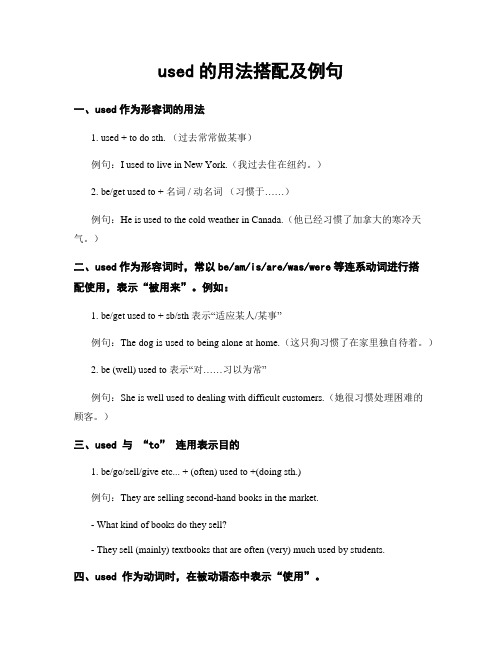
used的用法搭配及例句一、used作为形容词的用法1. used + to do sth. (过去常常做某事)例句:I used to live in New York.(我过去住在纽约。
)2. be/get used to + 名词 / 动名词(习惯于……)例句:He is used to the cold weather in Canada.(他已经习惯了加拿大的寒冷天气。
)二、used作为形容词时,常以be/am/is/are/was/were等连系动词进行搭配使用,表示“被用来”。
例如:1. be/get used to + sb/sth 表示“适应某人/某事”例句:The dog is used to being alone at home.(这只狗习惯了在家里独自待着。
)2. be (well) used to 表示“对……习以为常”例句:She is well used to dealing with difficult customers.(她很习惯处理困难的顾客。
)三、used 与“to” 连用表示目的1. be/go/sell/give etc... + (often) used to +(doing sth.)例句:They are selling second-hand books in the market.- What kind of books do they sell?- They sell (mainly) textbooks that are often (very) much used by students.四、used 作为动词时,在被动语态中表示“使用”。
1. be used + to do sth. 表示被动语态中的使用情况例句:In many cultures, chopsticks are used to eat food.- What are chopsticks used for?- They are used to pick up food and bring it to the mouth.五、used作为名词时,表示“二手货”,常用于buy/sell等动词后面。
usedto的用法详解
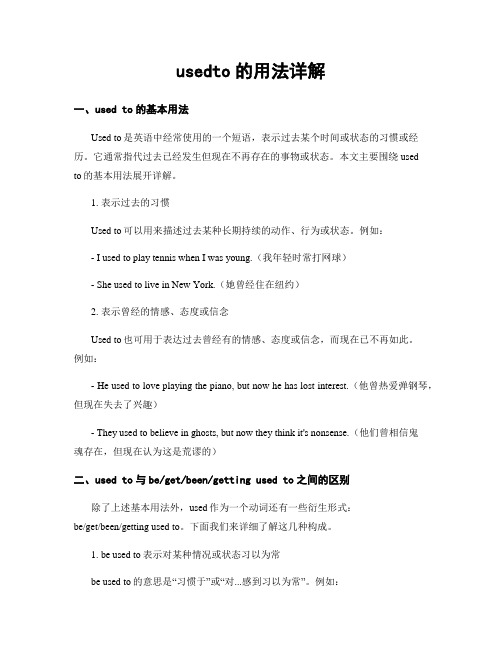
usedto的用法详解一、used to的基本用法Used to是英语中经常使用的一个短语,表示过去某个时间或状态的习惯或经历。
它通常指代过去已经发生但现在不再存在的事物或状态。
本文主要围绕usedto的基本用法展开详解。
1. 表示过去的习惯Used to可以用来描述过去某种长期持续的动作、行为或状态。
例如:- I used to play tennis when I was young.(我年轻时常打网球)- She used to live in New York.(她曾经住在纽约)2. 表示曾经的情感、态度或信念Used to也可用于表达过去曾经有的情感、态度或信念,而现在已不再如此。
例如:- He used to love playing the piano, but now he has lost interest.(他曾热爱弹钢琴,但现在失去了兴趣)- They used to believe in ghosts, but now they think it's nonsense.(他们曾相信鬼魂存在,但现在认为这是荒谬的)二、used to与be/get/been/getting used to之间的区别除了上述基本用法外,used作为一个动词还有一些衍生形式:be/get/been/getting used to。
下面我们来详细了解这几种构成。
1. be used to表示对某种情况或状态习以为常be used to的意思是“习惯于”或“对...感到习以为常”。
例如:- I am used to the hot weather here now. (我现在已经适应了这里的炎热天气)- She is used to working late nights.(她习惯晚上加班)2. get used to表示逐渐适应某种新的事物、环境或情况get used to意为“适应”,常用于表达一个人慢慢、渐渐地适应新环境的过程。
辨析used to,be used to do sth,be used to doing sth

3)Tom used to walk to school, now he rides a bike to school.(过去反复的动作)
4) There used to be a church here.(过去存在的状况)
used to否定形式可为used not to ,也可为 didn’t use to .疑 问句式也有两种:Did…use to?或 Used … to?
used to 的用法
罗平县富乐一中 李丽
used to 的用法 • used to do sth.过去常常…… • be/get used to sth./doing sth.习惯于……
• be used to do sth.被用来做…… • be used for sth./doing sth.被用于……方面
A. 选用适当的词组填空: 1. She _______ be quiet,now she is used to outgoing. is used to 2. He ______________ hard work. 3. English _________ computer. is used for 4. It’s difficult to understand Scottish people if you ______________ their are not used to accent(口音). 5. I don’t play tennis much these days, but used to I ____________. is used to 6. The wood ______________ make desks and chairs.
( A )3. He used to ____ in a small village, but now he has been used to ___ in the big city. A. live; living B. live; live C. living; live (C )4. Mrs Green _______ go to hospital, but now she is in good health. A. has to B. need to C. used to
get used to和be used to的区别

get used to和be used to的区别be used to是“习惯...”的意思,后接名词;get used to 表示“渐渐习惯....”与“be used to”不同,get used to 强调的是由“不习惯”到“习惯”的这个过程,而“be used to”所强调的只是“习惯了”这个状态。
1get used to和be used to的区别一、意思不同1、get used to:开始习惯于。
2、be used to:习惯于。
二、用法不同1、get used to:意思是“习惯”,指某人有规律地经常做某事,如咬指甲、抽烟等,由于这种动作反复地做,久而久之形成习惯或习性,做时不用思索。
有时也可指动植物的“习性”。
既可用作可数名词,也可用作不可数名词。
2、be used to:指群体经过一段时期不断沿用而变成的习惯,或者某个人反复地做某种动作,久而久之形成的自然习惯或习性,行动时不用思索。
三、侧重点不同1、get used to:get used to中的get侧重于渐渐习惯。
2、be used to:be used to中的be是长期习惯。
2use的例句Her article is a discussion of the methods used in research.她这篇文章论述的是研究中使用的方法。
More and more people are using the Internet.越来越多人在使用互联网。
It's very different to what I'm used to.这与我所习惯的大不相同。
The use of new technology is core to our strategy.运用新技术是我们策略的关键。
I have some information you may be able to use. 我有些可能对你有用的信息。
如何区别含“used to…”的句型

如何区别含“usedto…”的句型作者:佴启龙来源:《初中生世界(初二年级)》2007年第07期在英语中used to…, be used to…, be used to do…, be used as/for…等用法容易混淆,为了帮同学们弄清它们的用法,现总结如下:一、used to do sth.used to中的 to是不定式符号,后加动词原形,表示“过去常常做某事(而现在已不做)”,其时态形式不变。
1. 肯定句He used to get up early.他过去常常早起。
The river used to be clean. 这条河过去很干净。
2. 否定句用didn’t use to, used not to或usedn’t toHe didn’t use to get up early.他过去常常不早起。
The river usedn’t to be clean.这条河过去不干净。
3. 疑问句常用Did… use to…?或Used… to…?Did you use to be a teacher?= Used you to be a teacher?你过去是个老师吗? 4. 反意疑问句She used to live in the country, didn’t/usedn’t she?There used to be a big tree here, didn’t/usedn’t there?注意used to与 would的区别:1. used to表示过去习惯性的动作,现在已不如此了,would则表示过去和现在均可能有的习惯性动作。
两者意思基本相同,但used to较为口语化;used to常不需要表示时间的副词短语或从句,而would则需要。
例如:He used to get up early.他过去起床很早(现在起床不早了)。
He would get up late when he was young, but he is used to getting up early.他年轻时经常晚起,但现在习惯于早起了。
英语中used to与be used to的区别

英语中used to与be used to的区别1. be used to 意为“习惯于”,其中的 to 是介词,所以其后要接名词或动名词(不能接动词原形);若要强调从不习惯到习惯的过程,可用 get, become 等代替动词 be.如:He is used to looking after himself. 他已习惯于自己照顾自己。
I’m sure I’ll get used to the hard work. 我相信我会习惯这艰苦工作的。
注:be used to 有时可能是动词 use 的被动语态结构 (此时意为“被用来”,其中的to 为不定式符号,其后要接动词原形)。
如:A hammer is used to drive in nails. 锤子是用来钉钉子的。
2. used to 意为“过去经常”,其中的 to 是不定式符号,而不是介词,所以其后只接动词原形(不能接动名词)。
如:He used to live in Paris. 他过去一直住在巴黎。
注:used to 通常不能与表示具体次数(如 twice, three times 等)或一段时间(如 three months, five years 等)的词或短语连用,但是它却可以与 always, often 等表示经常性意义的副词连用。
如:正:I went to Paris three times. 我去过巴黎 3 次。
误:I used to go to Paris three times.正:I lived in the country for three years. 我在乡下住过 3 年。
误:I used to live in the country for three years.正:I always used [used always] to be afraid of dogs. 我过去总是怕狗。
used to 构成否定式和疑问式时通常有两种方式:即借助助动词did 或直接将 used 用作助动词。
【最全】used to do ,be used to doing ,be used for ,be used to do ,be used as用法辨析及练习(带答案)
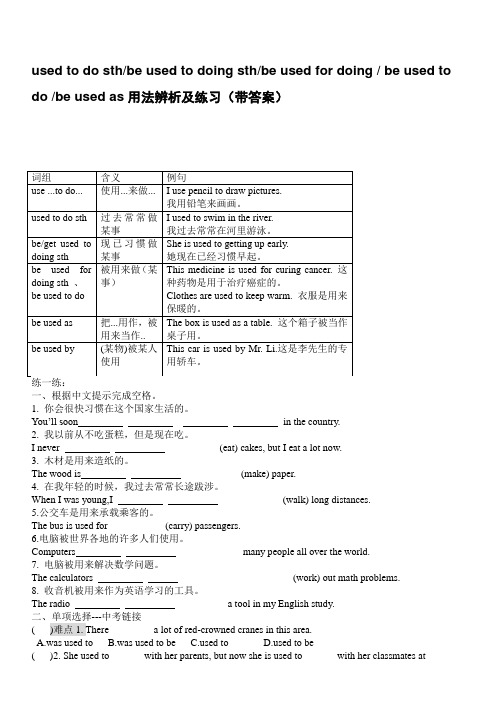
used to do sth/be used to doing sth/be used for doing / be used to do /be used as用法辨析及练习(带答案)school. (泰州)A. live; livingB.live; liveC.living; livingD.living; live( )3. He used to ____ in a small village, but now he has been used to ___ in the big city. (镇江)A. live; living B.live; live C.living;living D.living; live( )4. Mrs Green _______ go to hospital, but now she is in good health.A. has toB.need toed toD.ought to答案:一、1.get used to living ed to eat ed for making/used to makeed to walk5.carrying6.are used by7.are used for working/are used to work8.is used as二、1-4 D A ACThere used to be ...过去曾经有更多习题A. 选用适当的词组填空:1. Life here is much easier than it ____________ be.2. He ______________ hard work.3. I’ve lived in Paris for six years now, so I’m quit e _________ the traffic.4. It’s difficult to understand Scottish people if you______________ their accent.5. It was a bit of a shock: I_______________ paying so much for a sandwich and a glass of beer.6. I don’t play tennis much these days, but I ____________.7. The wood ______________ make desks and chairs.B. 动词填空:1. You’ll soon get used to ___________(live) in the country.2. I never used to ___________(eat) cakes, but I eat a lot now.3. I’m not used to _____________(treat) like this.4. When I was younger I was used to ____________(walk) long distances.5. I used to ___________(go) swimming on Saturdays.6. Didn’t she use to ____________(live) in Germany?C. 中考链接( )难点1. There ________ a lot of red-crowned cranes in this area.A.was used toB.was used to beed toed to be( )2. She used to ______ with her parents, but now she is used to ______ with her classmates at school. (泰州)A. live; livingB.live; liveC.living; livingD.living; live( )3. He used to ____ in a small village, but now he has been used to ___ in the big city. (镇江)A. live; living B.live; live C.living;living D.living; live( )4. Mrs Green _______ go to hospital, but now she is in good health.A. has toB.need toed toD.ought to1. My cousin is used to ________(study) with his new friends in Australia. (南京)2. My mother is used to ________(get) up early to cook breakfast for us. (一模)3. Mr Bush is used to __________(get) up early in the morning. (一模)4. Jim has lived in Australia for two years. He is used to _________(驾驶) on the left.5. This machine is used to wash clothes. =This machine _____________________ clothes.(同义句)6. Knives ________________ cutting things.7. I __________________ walking around the park after lunch.8.My uncle ____ go to work on foot, but now he ____ going to work by motorcycle.A. used to; is used toB. is used to; used toC. is used to; is used toD. used to; used to9. What did they ____ to do at the age of 19?A, to used B. used C. to use D. use10. My brother has been in London for ten years. Now he has ____ the climate there.A, used to B. been used to C. been use D. be used to11.Stone can ____ bridges.A, used to build B. be used to build C. be used to building D. used for building12.Have you ____ after supper?A, use to have a walk B. been used to having a walk C.been use to have a walk D. been used for having a walk13.She’s been used to getting up early, ____ ____? (反义疑问句)14.难点There used to be an old building in front of our flat, ____ ____ ?(反义疑问句)15. She used to go to school by bus.( 一般疑问句)______________________________________________________16.Mary used to have milk and bread for breakfast, ____ ?ed she B. doesn’t she C. did she D. didn’t she相关拓展(初中学生了解即可,不要求运用)used to 正式的否定形式为usedn’t 疑问形式为used提前。
小学一年级英语 Used to, Be used to, Get used to

I used to love the moomins. = I loved moomins when I was young.
I used to love the moomins. = IБайду номын сангаасloved moomins when I was young.
I don’t love moomins any more.
My cat is used to drinking milk.
It was strange at first but I quickly got used to left-hand traffic when I was in the UK.
Maria lived in her old house for 20 years. Now she’s getting used to the new one.
As a single he never cooked. As a husband he’s getting used to cooking.
My car was stolen so I’m getting used to travelling by train.
Complete the sentences using used to+ infinitive or be/get used to + ing form
Used to/ Would
He used to smoke a lot = He smoked a lot when he was younger.
He used to smoke a lot = He smoked a lot when he was younger.
He doesn’t smoke any more.
used相关短语
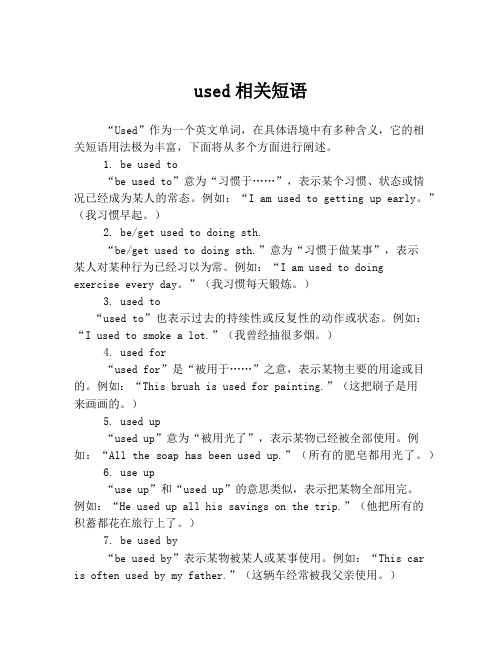
used相关短语“Used”作为一个英文单词,在具体语境中有多种含义,它的相关短语用法极为丰富,下面将从多个方面进行阐述。
1. be used to“be used to”意为“习惯于……”,表示某个习惯、状态或情况已经成为某人的常态。
例如:“I am used to getting up early。
”(我习惯早起。
)2. be/get used to doing sth.“be/get used to doing sth.”意为“习惯于做某事”,表示某人对某种行为已经习以为常。
例如:“I am used to doingexercise every day。
”(我习惯每天锻炼。
)3. used to“used to”也表示过去的持续性或反复性的动作或状态。
例如:“I used to smoke a lot.”(我曾经抽很多烟。
)4. used for“used for”是“被用于……”之意,表示某物主要的用途或目的。
例如:“This brush is used for painting.”(这把刷子是用来画画的。
)5. used up“used up”意为“被用光了”,表示某物已经被全部使用。
例如:“All the soap has been used up.”(所有的肥皂都用光了。
)6. use up“use up”和“used up”的意思类似,表示把某物全部用完。
例如:“He used up all his savings on the trip.”(他把所有的积蓄都花在旅行上了。
)7. be used by“be used by”表示某物被某人或某事使用。
例如:“Thi s car is often used by my father.”(这辆车经常被我父亲使用。
)8. get used to与“be used to”类似,“get used to”也表示习惯于某种情况。
例如:“I am getting used to the new job now.”(我现在正在逐渐习惯这份新工作。
过去常常做某事英语
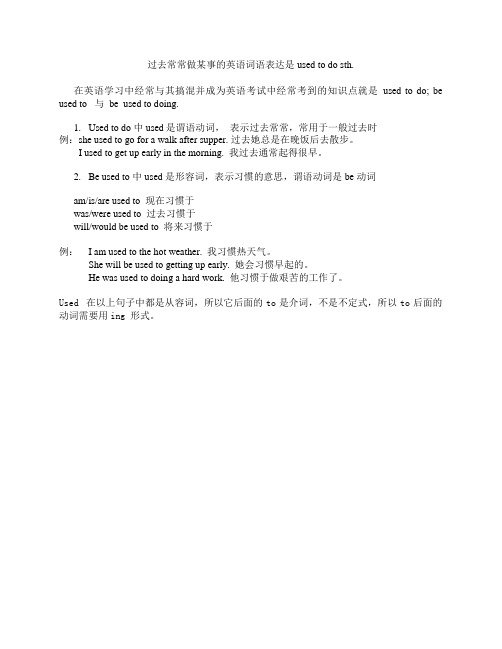
过去常常做某事的英语词语表达是used to do sth.
在英语学习中经常与其搞混并成为英语考试中经常考到的知识点就是used to do; be used to 与be used to doing.
ed to do 中 used是谓语动词,表示过去常常,常用于一般过去时
例:she used to go for a walk after supper. 过去她总是在晚饭后去散步。
I used to get up early in the morning.我过去通常起得很早。
2.Be used to 中 used 是形容词,表示习惯的意思,谓语动词是be 动词
am/is/are used to 现在习惯于
was/were used to 过去习惯于
will/would be used to 将来习惯于
例:I am used to the hot weather.我习惯热天气。
She will be used to getting up early.她会习惯早起的。
He was used to doing a hard work.他习惯于做艰苦的工作了。
Used 在以上句子中都是从容词,所以它后面的to是介词,不是不定式,所以to后面的动词需要用ing 形式。
- 1、下载文档前请自行甄别文档内容的完整性,平台不提供额外的编辑、内容补充、找答案等附加服务。
- 2、"仅部分预览"的文档,不可在线预览部分如存在完整性等问题,可反馈申请退款(可完整预览的文档不适用该条件!)。
- 3、如文档侵犯您的权益,请联系客服反馈,我们会尽快为您处理(人工客服工作时间:9:00-18:30)。
You useused to do sthto talk about something that happened regularly or was the case in the past, but is not now
Iusedtosmoke, but I gave up a couple of years ago.
I'mnotyetusedtogettingup early.
Areyouusedtodrinkingsoy milk with coconut water?
get usedto+verb-ing(+ …)
not get usedto+verb-ing(+ …)
Have/Has+ subject +got usedto+verb-ing(+…)?
Summary: used to, be used to, get used to and be used toin connection with verb forms
Positive
Negative
Question
Meaning
Example
usedto+infinitive(+ …)
didn’tuseto+infinitive(+ …)
Be+ subject +usedto +infinitive(+ …)?
to carry out a purpose or action by means ofsth
The barnwasusedby the bandtorehearsetheir new songs.
Isthisroomusedtostoreold tools?
I didn'tthink I could everget usedtolivingin a big city after living in the countryfor years.
Hasshegot usedto her new work?
be usedto+infinitive(+ …)
be not usedto+(+ …)
You usebe used to sth/to doing sthto talk about something that youarefamiliar with so that it no longer seems new or strange to you
We'reusedto the noise from the traffic now.
I didn'tuseto like him much when we were at school.
Did youuseto go to school by bus?
beusedto+verb-ing(+ …)
be not usedto+verb-ing(+ …)
Be+ subject +usedto+verb-ing(+…)?
You useget used to sth/to doing sthto talk about something that youbecomefamiliar with so that it no longer seems new or strange to you
Don't worry - you'll soonget usedto his sense of humour.
